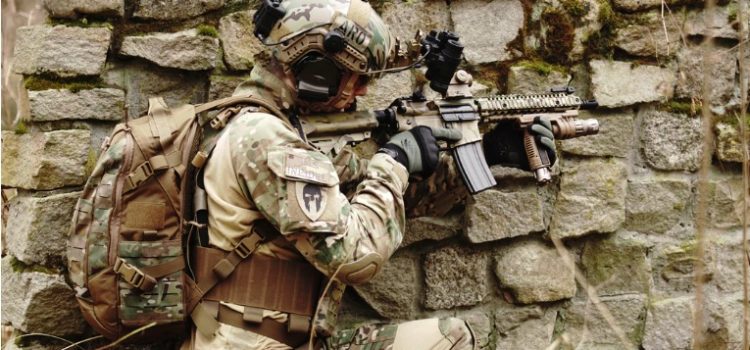Sun Tzu Art of War All Warfare Is Based on Deception

In The Art of War, Sun Tzu says, "All warfare is based on deception." What does Tzu mean by this?
Deception was an of import element of Sun Tzu's battle strategies. Learn why all warfare is based on deception.
All Warfare Is Based on Deception
The goal of whatsoever disharmonize is to control your opponent and overcome them. Decision-making their beliefs about your abilities helps you understand their assumptions and plan a strategy accordingly. As a well-known translation of Sun Tzu puts information technology, "all warfare is based on charade."
Deception includes feigning weakness when y'all are potent or professing ignorance when you lot are informed. Actualization to exist weak, unprepared, or small in size can lure your opponent into traps and make them susceptible to misguided actions or responses.
For instance, creating a scenario where merely a modest portion of your force is visible can mislead opponents into thinking they outnumber or outarm you. When they gear up an attack nether that guise, they volition be ill-prepared for the total force of your forces.
Some other example of the lesson that all warfare is based on charade is allowing your opponent to win small victories or gains. Your opponent may fall victim to greed or an inflated ego, which will confuse and hinder their strategy when the truth is revealed.
Historical Example: All Warfare Is Based on Charade
When a Chinese emperor was strategizing an assault on the Han dynasty, which had joined forces with the Huns, he sent a lookout to telescopic out the Huns' forces. Ten scouts returned afterwards seeing old and feeble men milling almost and reported that the Huns were weak. However, ane scout, Lou Jing, saw the placement of these men equally a ruse and reported that an attack would be unwise. The emperor punished Lou Jing for this advice and sent a massive strength into Hun territory.
Lou Jing had been right. The subconscious Huns forces surrounded the emperor'due south men and stranded them for a week without supplies. All warfare is based on deception.
Deception & Orthodox vs. Unorthodox Action
In battle, fighting is unremarkable. It is straightforward in action. But victory is attained through the remarkable, and all warfare is based on charade. Unremarkable and remarkable actions are as well referred to equally orthodox and unorthodox deportment, respectively.
Both orthodox and unorthodox actions are taken during disharmonize. Ensuring victory means having a control of both orthodox and unorthodox actions.
Orthodox actions are straightforward techniques—tried and truthful behaviors and formations.
- For example, fighting on the front lines or attacking a valuable territory are orthodox actions.
Unorthodox deportment are surprise attacks and other maneuvers outside the typical boundaries of battle.
- For example, ambushes and charade are unorthodox tactics.
Orthodox and unorthodox tactics should exist composite to work in harmony. Like the endless combination of colors derived from the five main colors, at that place are multiple variations encompassed within the primary deportment of orthodox and unorthodox behaviors.
- Orthodox behavior is always direct, and unorthodox behavior is always a surprise.
- Simply the manifestation of each is endless in its possibilities.
Manipulate what your enemy views every bit orthodox and unorthodox behaviors. By feigning orthodox behavior, you set your opponent upwardly for attack through unorthodox action. For instance, disorganization emerges from organization, fear emerges from bravery, and vulnerability emerges from strength.
- If you want to announced unorganized, you lot must offset be organized.
- If you want to announced cowardly, you must come from a place of courage.
- If you want to announced weak, you lot must start from a foundation of strength.
- These deceptions will mislead your enemy.
Deception is a cracking fashion to proceeds information well-nigh your opponent. If they call up y'all are weak and they assail, you know the level of their assailment and greed. Call up, all warfare is based on deception.
Any fourth dimension you lot can confuse or deceive the opponent, y'all force them to adapt. In these adaptations, you can discern their patterns of movement, strength of strength, and tendencies to react.
- This information becomes useful in determining how to strategize confronting them.
- You lot will know in which situations they will fight and which they will run.
- You can determine when lives volition exist threatened and when lives can exist saved.
- You tin can find out where the gaps in their strength are, otherwise known as vulnerabilities.
- With this information, y'all tin can strategize when attacking is benign and when defending is more beneficial.
Practise not repeat tactics or strategies. The possibilities of orthodox and unorthodox actions are countless, so constantly suit both to serve the momentum and remain mysterious.
To gain advantage in a strange place, you must use deception to manipulate the enemy.
- Feign your status to fool enemies.
- Divide and combine forces to exhibit false formations while you are actually formless. Simulated formations misfile and mislead the enemy.
- Confuse the enemy with charade and formlessness, and they will work overtime chasing you around.
Charade & Leadership
A good leader gets their opponent to open the door and appears innocent so every bit to be allow in. One time in, they wreak havoc similar a virus. A skilful leader knows that all warfare is based on charade.
A good leader uses tactics to confuse and discombobulate the opponent, drives wedges amidst the enemy's troops and populace, relies on unorthodox and orthodox tactics, and strikes when it is advantageous and tin can be washed in a way that leaves the enemy without time to prepare.
hollidayagrad1954.blogspot.com
Source: https://www.shortform.com/blog/all-warfare-is-based-on-deception/
0 Response to "Sun Tzu Art of War All Warfare Is Based on Deception"
Post a Comment